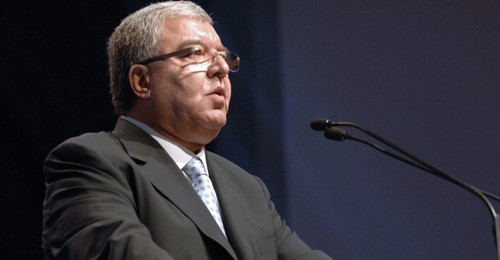 Lebanon Interior Minister Nouhad al-Mashnouq stressed on Wednesday that the parliamentary elections “will be held on time” under the controversial 1960 electoral law unless a new law is passed.
Lebanon Interior Minister Nouhad al-Mashnouq stressed on Wednesday that the parliamentary elections “will be held on time” under the controversial 1960 electoral law unless a new law is passed.
“The elections will be held on time and won’t be postponed for a single day, unless a new law is passed,” Mashnouq told reporters after a Cabinet session that was chaired by PM Saad Hariri at the Grand Serail.
Earlier in the day, Prime Minister Saad Hariri had stressed that the government’s “priority” is the organization of parliamentary elections.
Mashnouq and Speaker Nabih Berri had recently warned that the country is likely headed to parliamentary elections under the 1960 law due to the failure of politicians to agree on a new law.
In a related development President Michel Aoun announced Thursday that the upcoming parliamentary elections will be held “on time” and according to a law “that enjoys the consensus of the Lebanese.”
Aoun also called for voting for “parties and not individuals” in the parliamentary polls.
“We have founded parties that can create strong blocs and make achievements. An MP alone does not have the ability to plan or impose certain planning, that’s why we encourage voting for parties and not individuals, who are ineffective force in parliament,” Aoun told a delegation comprising the municipal chiefs and mayors of the Keserwan district.
Retired Brigadier General Chamel Roukoz, the former Commando Regiment chief and Aoun’s son-in-law, attended the meeting. Roukoz, who hails from Keserwan, intends to run in the next parliamentary elections.
Separately, Aoun vowed to “continue the course of reform, combating corruption and controlling expenditure.”
Aoun defended on Tuesday proportional representation electoral system stressing that endorsing it guarantees proper representation in the upcoming parliamentary elections and stated that fears of it are not justified.
“Our utmost priority is to stage the parliamentary elections based on a new electoral law that guarantees proper representation for all Lebanese factions,” said Aoun in a speech during a meeting with the diplomatic corps at Baabda palace.
“Concerns of some political parties over endorsing a proportional representation system are unjustified. Only a proportional system is capable of ensuring proper and just representation for all parties,” added the President.
He then added: “Some might lose their seats at parliament shall this system be applied but in the end we will all win the country’s stability.”
“My will as president of Lebanon is to dedicate this position to embracing the unique Lebanese composition that is based on diversity, which has proven over the years an ability to confront challenges,” said Aoun.
“My will is to provide stability at the security, political, economic, social and financial levels to enable Lebanon to restore the positive role known to all on the international arena. We have started setting the plans for that, and some of these plans are on their way to implementation.”
The President also stressed that he is keen on protecting Lebanon’s sovereignty and preserving its national unity.
His comments come a day after the party that he founded , the Free Patriotic Movement warned Monday of “ revolution” should the political forces fail to agree on a new electoral law to replace the so called 1960 law.
Aoun’s ally , the Iranian backed Hezbollah has repeatedly called for an electoral law fully based on proportional representation but other political parties, especially the Future Movement, have rejected the proposal and argued that the party’s controversial arsenal of arms would prevent serious competition in regions where the Iran-backed party has clout.In 2013 Lebanese Forces and The Future Movement backed by the PSP agreed on a hybrid electoral law which calls for 54% of the MPs to be elected under the majoritarian winner-takes-all system and 46 % under the proportional representation system. This draft law was rejected by the Hezbollah-led March 8 opposition.
Also in 2013 Future Movement leader PM Saad Hariri rejected the electoral law that is based on proportional representation because there will be competition in some regions, but there cannot be any competition in other regions, because of the presence of Hezbollah weapons in them.
Hariri was referring to the 2009 election in the areas dominated by Hezbollah. According to the reports that surfaced back then Hezbollah gunmen prevented their rivals from voting and the results of the election showed it. On the other hand in the March 14 dominated areas several Hezbollah backed candidates won the election that was based on winner take all . In a proportional representation system Hezbollah will be able to gain more seats in the March 14 dominated areas but will not lose any seats in its dominated areas as long as it is allowed to keep its arms and use them internally for political gain .
According to analysts Hezbollah is trying to use Aoun to dominate Lebanon by insisting on adopting the proportional law in a single or several expanded electoral districts.
The country has not voted for a parliament since 2009, with the legislature instead twice extending its own mandate.
The 2009 polls were held under an amended version of the 1960 electoral law and the next elections are scheduled for May 2017.

Leave a Reply
You must be logged in to post a comment.